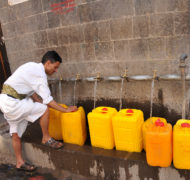Cup of Water
Daily Reflection / Produced by The High Calling
“Then the King will say to those on his right, ‘Come, you who are blessed by your Father; take your inheritance, the Kingdom prepared for you from the beginning of the world. For I was hungry and you gave me something to eat and I was thirsty and you gave me something to drink.”
Matthew 25:34-35
In the story of the sheep and the goats, Jesus says that tending the poor, the sick, the imprisoned means we are literally taking care of him. He becomes incarnate when people need us and we help them. What’s more, he’s not talking about big, dramatic acts of kindness. He’s talking about a bite to eat, a visit, a drink of water. And we don’t even know we’ve done anything good or met Jesus.
Soon after my parents died, I found myself hurting so badly that I developed a crush on Sam, only I didn’t know he was married until I looked him up in the phone book and saw his wife’s name next to his. The energy of that infatuation had lifted me out of the darkness of grief and too much work, but it was not good. “Run,” the Bible advised, but I was tangled in feelings.
So I called a friend, and I confessed.
“Come for dinner,” my friend offered. We talked about Sam, my struggles with work, and our dreams for writing. I turned away from Sam but still own the gifts my friend gave me: a business card case, a white teapot—gifts that spoke to my work and my love for antiques and tea. I’ve long since forgotten what he told me, but I do remember how he treated me like a beautiful, graceful woman.
On a different occasion, after I published When the Plow Cuts, I sent it to my hero Annie Dillard. At that time in my life, I was embroiled in a family dispute. When a post card arrived from Annie saying she admired and enjoyed my poems, I begged off the fight and chose making poems instead.
You know what? I bet neither of these two thought they did much of anything.
These days people say Jesus was talking only about feeding the literal poor, but I also think he was talking about extending small kindnesses to people like me. Miller Williams about says it: “Have compassion for everyone you meet, even if they don't want it. What seems conceit, bad manners, or cynicism is always a sign of things no ears have heard, no eyes have seen. You do not know what wars are going on down there where the spirit meets the bone.”
QUESTIONS FOR FURTHER REFLECTION: How did you cope with grief? What are your stories about people treating you kindly? When have you helped someone who was hurting?
PRAYER: Lord, help us to honor the people we meet with kindness, even if all we’re offering is asking about their day or responding with a simple thank you. Help us to see everyone, even the grumps, as though they are you, Jesus, because maybe they are. Amen.






